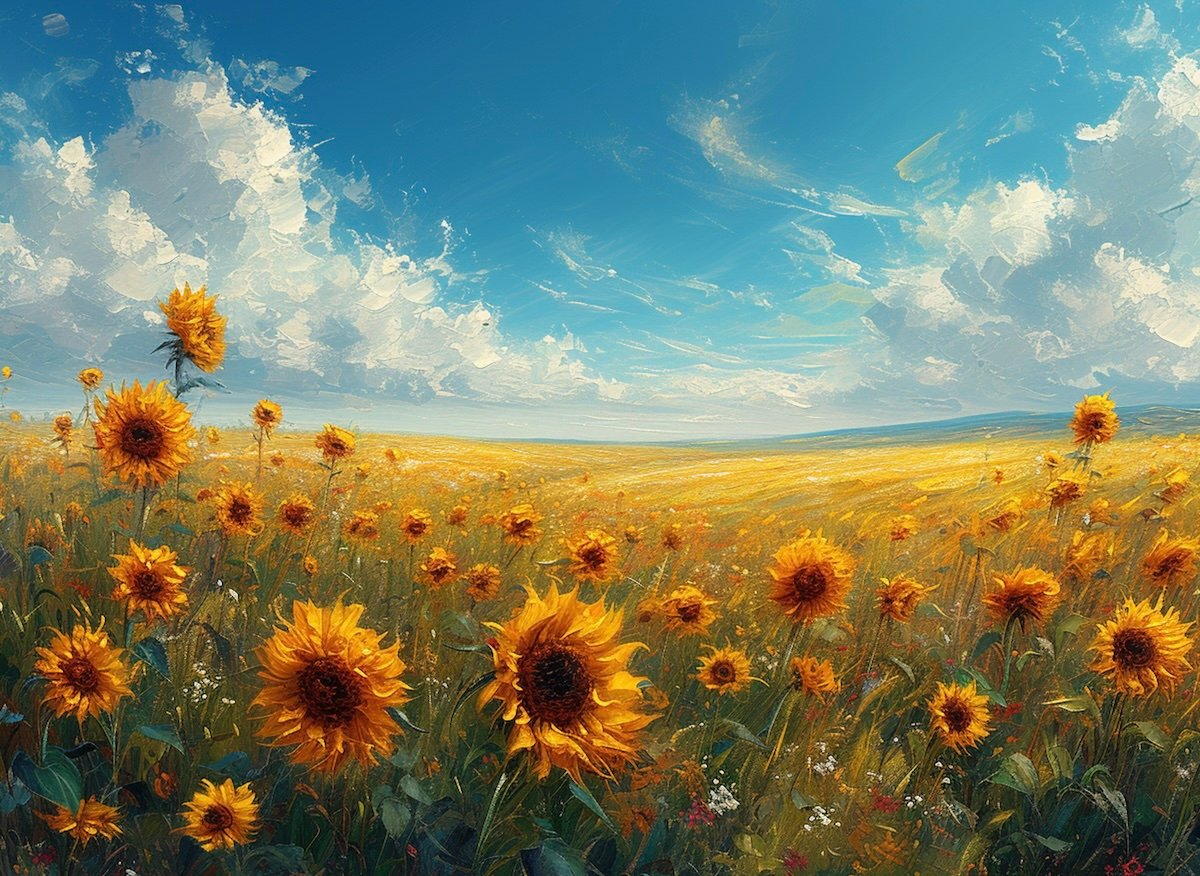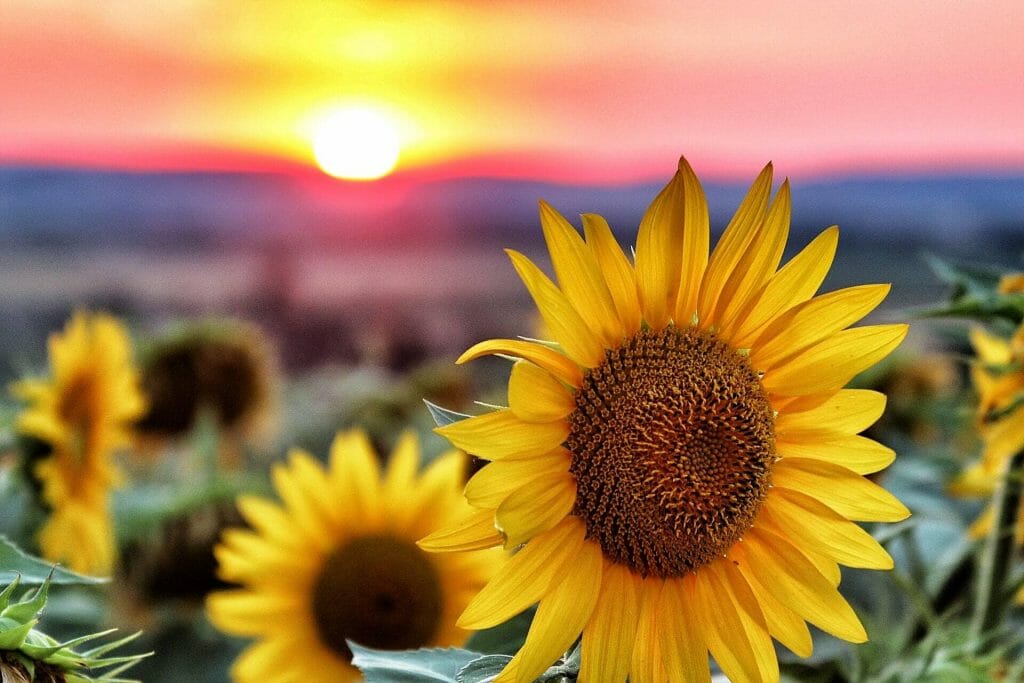The Sunflower: Meanings, Myths, and Folklore
Nothing says summer quite like a meaningful bouquet of sunflowers. Whether they’re your favorite flower to receive as a gift or you love to plant sunflowers in your garden, these majestic flowers have an incredible story. Sunflowers have deep historical roots and cultural ties all around the world. Join me as I explore the rich meaning, symbolism, and cultural significance of sunflowers in the language of flowers.

Sunflowers in Greek Mythology
The sunflower’s genus Helianthus comes from two ancient Greek words, ‘helios’ which refers to the sun, and ‘anthos’ meaning flower. There’s even a Greek myth surrounding sunflowers, explaining why they always face the sun.
The myth goes that Clytie, a nymph, adored Apollo and was jealous of Apollo’s new love for Leucothoe. When Clytie informed Leucothoe’s father of the relationship with Apollo, he buried Leucothoe alive as punishment.
Apollo, obviously angered by the ordeal, turned the buried Leuchothoe into a sunflower who continued to adore Apollo, even in flower form.
As a sunflower, she would watch Apollo as his chariot moved the sun across the sky each day, in the same way that sunflowers keep their faces toward the sun.
Coming from this myth of Clytie, Apollo, and Leucothoe, the most common sunflower meaning includes adoration, loyalty, and longevity. Therefore, sunflowers make popular and well-received gifts for loved ones and friends.
Chinese Folklore
Sunflowers in Chinese culture symbolize good fortune and longevity, reflecting the flower’s ability to turn towards the sun. Historically, they were valued by Chinese nobility, who consumed them as snacks, believing they could promote a long life.
Sunflowers in the Victorian Langauge of Flowers
In the language of flowers or floriography, sunflowers symbolize adoration, loyalty, and longevity. To the Victorians, they represent the sun itself, conveying warmth, happiness, and a deep appreciation for the positive aspects of life.
Native Americans and Sunflowers
Sunflowers hold significant value for many Native American tribes, serving practical and symbolic purposes. The flowers were often cultivated sunflowers for their seeds, a vital food source, and the plant’s oil was used for cooking and skin applications.
Sunflowers also had ceremonial and dye uses. Symbolically, sunflowers represent the sun deity in some cultures, embodying energy, fertility, and the cycle of life.
Third Wedding Anniversary Flowers
The sunflower is recognized as the official third wedding anniversary flower. This vibrant and sturdy flower symbolizes love, loyalty, and longevity, capturing the essence and growth of three years of marriage. The sunflower’s strong stem and bright petals reflect the solid foundation and joyful moments a couple has shared and looks forward to in their future together.
Sunflowers and the Zodiac
Sunflowers are the official zodiac flower for the Leo star sign. The Leo is often associated with lions, and what better flower to reflect this powerful energy than the sunflower? Sunflowers are bold and vibrant blooms, mirroring Leo’s energetic personality.
The sunflowers symbolize strength and loyalty, both common Leo traits. Leos are also known as natural leaders. Sunflowers reflect this trait well with their height and ability to stand out from miles away.
Color Symbolism

Sunflowers are symbolic of the sun; hence, their name is rather fitting. Most commonly, sunflowers have bright yellow petals reminiscent of the sun. And like the sun, sunflowers most often symbolize happiness and joy.
As sunflowers made their way to Europe, their popularity grew, becoming a symbol of beauty and sustenance.
Sunflowers in Art & Literature
In particular, artists seemed to revel in the uniqueness and splendor of sunflowers, and they began to appear in many artworks of the Impressionist and Expressionist era.
Notably, Van Gogh’s sunflower series is an iconic collection of art that symbolizes birth, life, and death in stunning depictions of the phases of multiple bouquets of sunflowers.
Ai Wei Wei is another artist also inspired by sunflowers which were depicted in his Sunflower Seeds exhibit at the Tate Modern in London.
The Chinese artist used sunflowers to make a statement about the relationship between the individual and the masses, with millions of porcelain sunflower seeds handcrafted for the installation.
Sunflowers and Religion
Some American sunflowers were also considered religious symbols, perhaps because of their heliocentric nature, as they always face the sun. Therefore, sunflowers often represent worship and faithfulness associated with the desire to seek out light and, in turn, truth.
The Incas of the Andean region of South America even used sunflowers to symbolize their Sun God. It’s said that the Incas would bring sunflowers to the temples for worship, and the priestesses would adorn sunflowers to their clothes and headdresses.
Colors have a lot to do with symbolism as well. The yellow petals of most sunflowers symbolize intelligence, vitality, friendship, and happiness.
Final Thoughts
Overall, sunflowers are more than glorious yellow petals that make joyful gifts. In the past, they were used as symbols of worship and devotion, and even today, they signify loyalty, long life, and adoration. They’ve bled into our cultural world as the main feature of iconic works of art, and they’re the perfect gift for friends and family. Whether they’re growing in your backyard or in your indoor garden, sunflowers are a beautiful way to welcome the summer.
Andrew is the Editorial Director at Petal Republic. He holds a BSc degree in Plant Sciences and has trained professionally at leading floristry schools in London and Paris. In amongst overseeing a global editorial team, Andrew's a passionate content creator around all things flowers, floral design, gardening, and houseplants.
